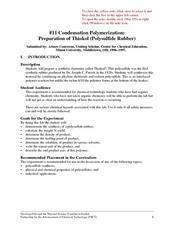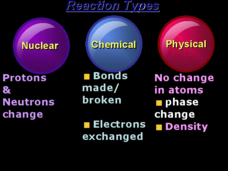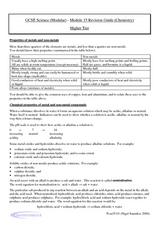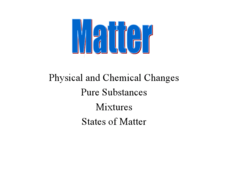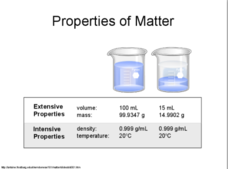Curated OER
Energy Conservation
Third graders discuss four points related to conservation. They work in groups to design a package to keep an ice cube from melting to demonstrate the concept of insulation. They then make a chart that shows which materials used did the...
Curated OER
Condensation Polymerization: Preparation of Thiokoll® (Polysulfide Rubber)
This lab activity is geared toward experienced chemistry learners, in particular, those who are familiar with organic chemistry. They will create a synthetic elastomer and then make observations and measurements of its different...
Curated OER
Chemistry Slide Collection
A huge slide show provides a review of almost every topic there is to cover in basic chemistry! Your young scientists will be interested to see each illustration and example given. The appearance of the 120 slides varies greatly, most...
Curated OER
Review Set
The topics covered in these multiple choice questions are about atomic structure and bonding, state configurations, pressure and solution concentration, and energy graphs. This is a midterm review which could be used with the whole...
Cornell University
Atomic Bonding
Explore the connection of surface area to bonding within atoms. Learners complete lab investigations to model changing surface area with different sizes and concentrations of atoms. A flour fireball demonstration follows the labs to...
Curated OER
Revision Guide - Chemistry
Don't you wish you had the time to type up a study guide for your chemistry class? With this resource, there is no need! A chart comparing the properties of metals and non-metals tops the handout, followed by notes on the reactivity...
Curated OER
Metals and Non-Metals
A table of the physical properties of metals and non-metals opens this high-school chemistry handout. Also covered are the chemical properties of metals and non-metals, reactivity, and fossil fuels. There are no specific questions to...
Curated OER
Dry Ice: Simply Sublime
A fascinating lesson plan on states of matter is here for your young scientists. Dry ice is used to challenge learners preconceived notions about how solids work. They discover all sorts of interesting facts about states of matter from...
Curated OER
WS 1.2 Metric Units I/ Physical vs. Chemical
In this metric units and properties activity, students determine the proper metric unit given a variety of measurements for specific items. They also identify chemical and physical properties and chemical and physical changes.
Curated OER
Chemistry Foundations
Extensive notes on foundational chemistry concepts make up this resource. It summarizes the properties of matter, the periodic table, chemical nomenclature, and general chemical bonding. Design a set reading comprehension questions to go...
Polar Trec
South Pole Ice Cream!
How can you turn an ice cream activity into a scientific investigation? It's easy if you know ionic compounds, heat transfer, and the exothermic and endothermic process. Learners will explore the science behind freezing, insulation, and...
Curated OER
Classification of Matter
This is a great worksheet with an infographic to assist your students in categorizing matter into mixtures and non-mixtures. Information is given about the metric system of measurement. Your young students match 13 terms with their...
Curated OER
Elements Commercials
Student teams use a digital camcorder and iMovie to create a commercial about an element. They also use the Internet and their textbook to gather the following information about their element: the name, the symbol, the atomic number, the...
Curated OER
Atomic Structure and Ionic Bonding (A Visual Approach)
Using toothpicks, marshmallows, and round colored sticky dots, physical science enthusiasts build models of an atomic nucleus. In this eighth grade chemistry lesson plan, they play an atom-naming game with the models that they have...
Curated OER
Covalent Bonding
Using chlorine as the model to demonstrate the structures and representations, this PowerPoint clearly labels and details the main atomic structures and reasons for bonding. The electrons in the outer shell are diagramed and then the...
Curated OER
Matter
In a neat and straightforward manner, this PowerPoint delivers basic introductory information on the properties of matter, physical and chemical changes, and pure substances vs. mixtures. It also defines the states of matter. For some...
Alabama Learning Exchange
Float or Sink?
Experiment with mass and density as scholars figure out what makes things float or sink. First, they watch a podcast introducing these concepts. Be sure to use the comprehension question to test their understanding. Young scientists...
NOAA
Ocean Layers I
How is it possible for ocean water to have layers? The sixth installment of a 23-part NOAA Enrichment in Marine sciences and Oceanography (NEMO) program investigates factors that cause different water densities to occur. Experiments...
NOAA
Ocean Layers II
Now that you know the ocean has layers, let's name them. The seventh installment of a 23-part NOAA Enrichment in Marine sciences and Oceanography (NEMO) program covers terminology associated with ocean layers, such as thermocline and...
Normal Community High School
Density
Change the density of water by adding minerals. The presentation discusses density—from the definition to calculations—and applies it to the real world. It briefly mentions specific gravity, and finishes by showing Archimedes'...
Curated OER
Arkansas State Rock
Here is a lesson plan which shows the value of a mineral called bauxite to Arkansas during the early 1900's. Learners relate the five themes of geography to the history of bauxite and aluminum production in Arkansas. For teachers of...
Curated OER
How Is the Periodic Table Organized?
Fifth graders access an Interent site to review the Periodic Table. They identify patterns and draw conclusions about the organization of the periodic table. They complete a teacher created chart using the Periodic Table.
Curated OER
Ranking Molecular Properties Based Upon Intermolecular Forces
A splendid chart of information about chemical bonding tops the first page. In it you will find information on London forces, permanent dipoles, hydrogen bonds, ionic bonds, and covalent bonds. A four-step process for assigning...
Science Geek
Metallic Bonding
Introduce your class to metallic bonding with a presentation that covers packing in metals, substitutional alloys, interstitial alloys, and properties of metals.



